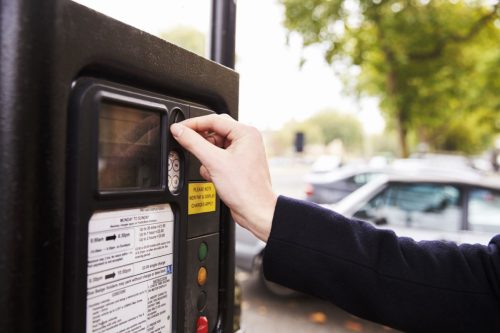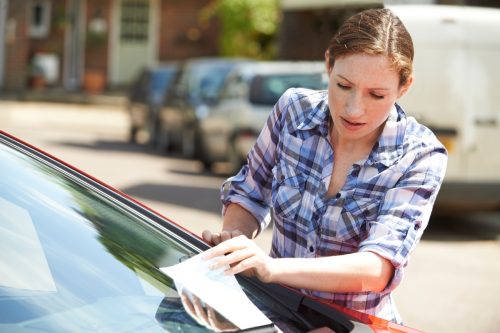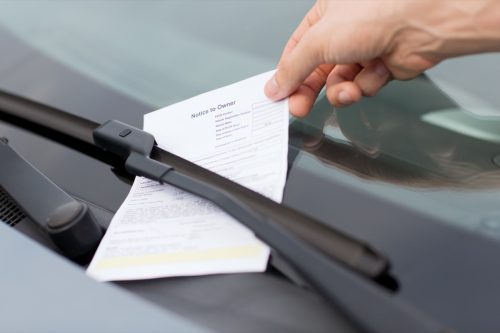If You Find This on Your Car, Report It Immediately, Police Say in New Warning

Whether you’re headed to a meal or simply running errands, finding something unexpected on your car can really derail your day. There are a number of unpleasant additions you might notice, from a parking boot or ticket to slashed tires or a nasty scratch. These will all delay your departure, but police recently issued a warning about something else you might find that means you’re being targeted by scammers. Read on to find out what law enforcement is asking you to report immediately if you see it on your vehicle.
READ THIS NEXT: If You See This While You’re Driving, Call 911 Immediately, Police Warn.
Car-related crimes and cons have become more common.

Police nationwide have issued different scam warnings for drivers, including an alert about a ruse involving QR codes. Fraudsters stick the scannable squares to parking meters, the San Antonio Police Department warned late last year. The codes have accompanying text informing drivers that they can use the QR codes to pay for parking, when in reality, the QR code takes them to a fraudulent website to make a phony payment.
Parking lots carry their own set of dangers, as police in Wilkes-Barre Township, Pennsylvania, issued a warning about an uptick in reports of scammers trying to sell fake jewelry while shoppers walked to and from their parked cars.
Yet another parking lot scheme involves people pretending to play the violin for money outside of grocery stores. These scammers often have accompanying signs asking for money to feed their families, but the claims aren’t true, police nationwide said.
Now, authorities have issued yet another warning for drivers, urging them to pay close attention to their windshields.
This new scam looks legit.

We’ve all been there—after enjoying a shopping trip, you return to our car and find a dreaded parking ticket. These tickets can carry hefty fines, depending on where you’re parked, and you might even have to go to a hearing if you want to fight the citation. But police in Fairfax City, Virginia, say another “ticket” is more troublesome to receive.
According to a tweet from the Fairfax City Police Department (FCPD), scammers have found a way to foist fraudulent parking tickets on unsuspecting drivers. These fake tickets aren’t riddled with typos or other clear scam giveaways, as seen in a photo taken by the FCPD, and they even include the Fairfax City seal and legal jargon to make the con more convincing.
RELATED: For more up-to-date information, sign up for our daily newsletter.
Fraudulent tickets were also found in Atlanta.

This isn’t the first time Fairfax City has experienced parking ticket scams, having previously warned the public about a string of incidents in July 2021. As part of the latest scheme, however, police suspect that fraudulent tickets were submitted through a mobile app called Turo, through which drivers can rent cars from different private owners.
These tickets were digitally distributed, but earlier this year, police in Atlanta, Georgia, warned that drivers had found printed tickets on their car windshields, Fox 5 Atlanta reported. Similar to the parking meter scheme, the tickets had a QR code that instructed unsuspecting victims to pay through a website called “ATL Citations.” One victim went to the address listed on the company website to pay in person instead, only to find out that it was the address of an auto repair shop with no connection to the parking ticket.
The ticket looked convincing thanks to the use of similar colors and styles to actual parking tickets, with “City of Atlanta” written on top and a police officer’s name included. While they might look legitimate, the Atlanta Department of Transportation told Fox 5 that one way to spot a scheme is by a QR code, as tickets distributed by their office never have these codes.
Police ask that you report these scams.

If you received a fraudulent parking ticket, particularly through the Turo app, police ask that you contact authorities immediately. Avoid opening up a line of communication with scammers by looking up the number for your city’s parking or police department, rather than calling any number listed on the ticket, experts at DefensiveDriving.org recommend. Police will be able to confirm whether or not your ticket is legitimate and ensure that you aren’t unintentionally paying criminals.